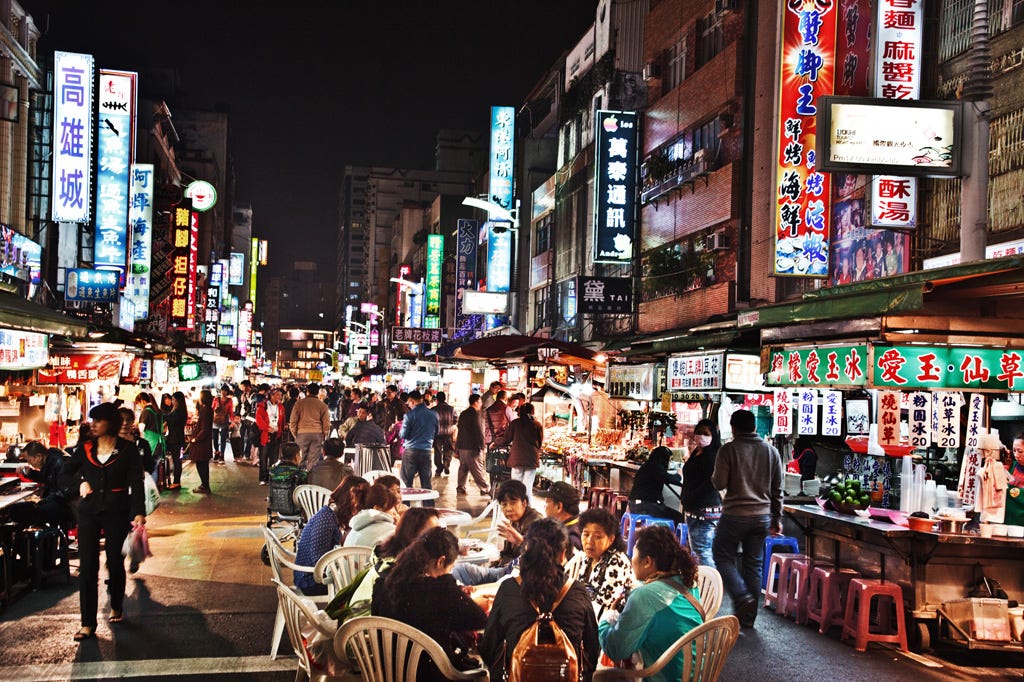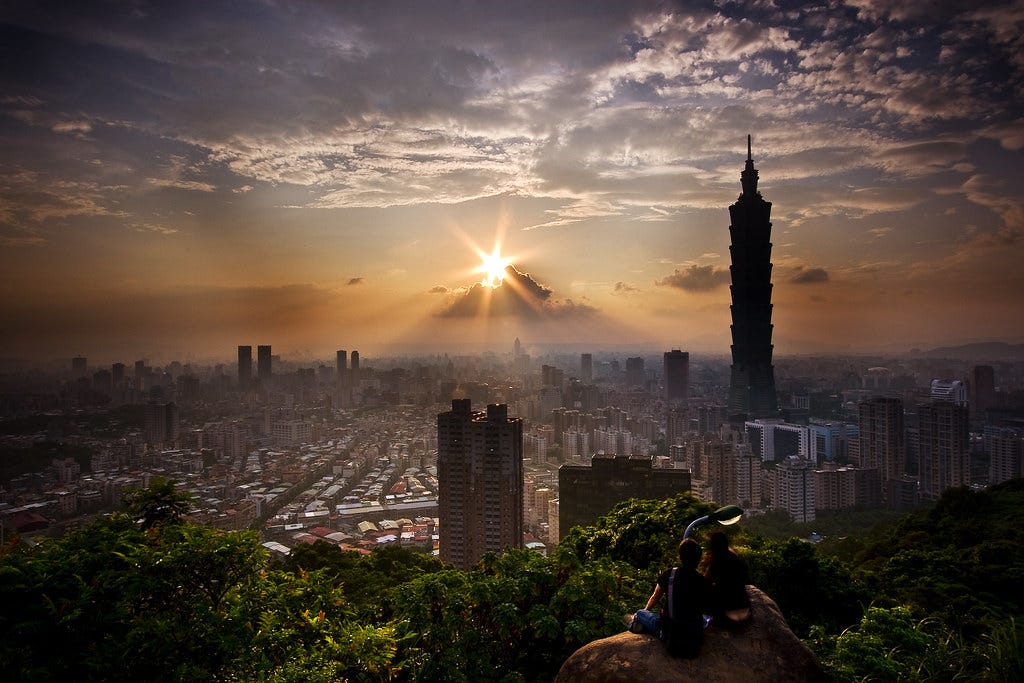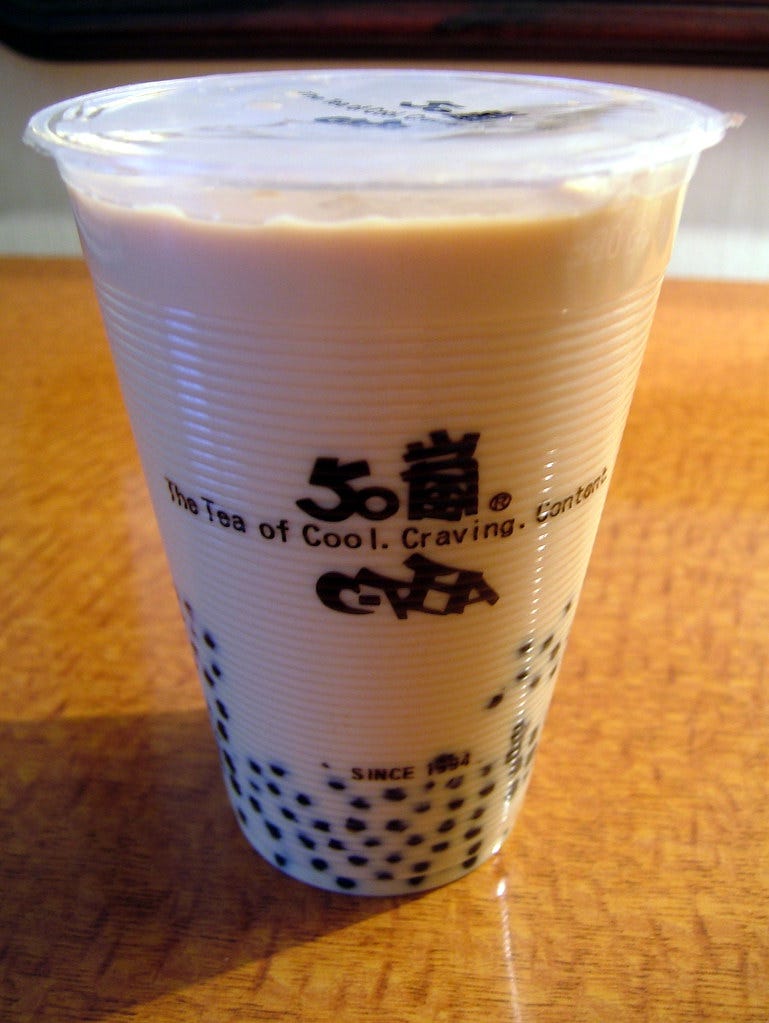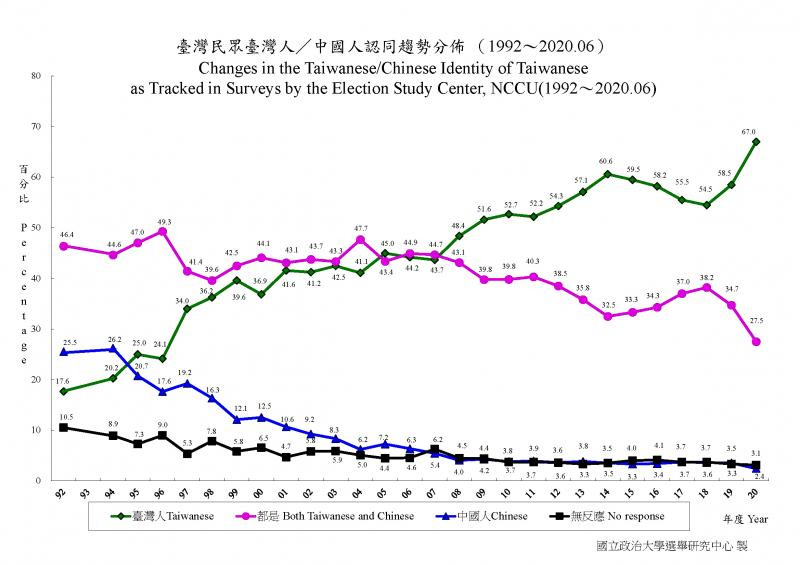Taiwan is a civilization
Americans should be more aware of Taiwan.
In my experience, Americans tend to have more awareness of some countries than others. Consider the rich countries of East Asia. The American mental image of Japan, though inaccurate in many ways, is pretty well-formed. Americans generally know that anime and video games and manga — things an increasing number of Americans enjoy — come from Japan, and they often have a mental image of dense, neon-lit Japanese cities and fast, efficient Japanese trains. Decades of exposure to Japanese popular culture, combined with a tourism boom in that country, have made Americans generally cognizant of Japan’s existence. Now, the boom in Korean pop culture is similarly making Korea a place that Americans think about.
But I don’t think Taiwan is on that list yet. You don’t really hear about Taiwanese pop music, TV, or other pop culture. Taiwanese food exists, but except possibly for bubble tea, most Americans probably wouldn’t recognize it.
This seems like something that ought to change. Most importantly, because Taiwan seems really cool. But also because it’s geopolitically important, because it’s probably the most likely flashpoint for great-power war.
Taiwanese people generally don’t think of themselves as “Chinese” anymore (Update: Here is a brief blog post of history explaining some of the reasons for this):
But China’s government disagrees pretty vehemently. In recent years, China has increased its bellicose and threatening rhetoric toward Taiwan. Its military has stepped up incursions into Taiwan’s airspace, and has modernized its amphibious forces for a possible invasion. In response, the U.S. has moved to establish closer ties with Taiwan, ramped up our own rhetoric against Chinese aggression. The U.S. is not sworn to defend Taiwan (as we are sworn to defend Japan), but as Biden’s nominee for Secretary of State, Antony Blinken, has stated forcefully that the U.S. will help Taiwan defend itself, and has warned China against an attack.
This means that there is a nonzero chance that the U.S. might find itself embroiled in a superpower conflict on Taiwan’s behalf sometime in the next decade. Which is a good reason for Americans to learn more about Taiwan.
But an even better reason is just that Taiwan is a very interesting and unique place. People can argue all day about whether it’s really a country (it is), but what’s more important is that Taiwan is a civilization.
Anyway, I myself am a complete newbie to Taiwan; I’ve never even been there. So here are just a few quick things I have learned about Taiwan since I started paying more attention to it over the last year. Obviously this is no real guide to Taiwan, just the very tip of the iceberg. But something to get Americans thinking.
Superior public health

Besides tensions with China, there was another big news item that made me more aware of Taiwan this year: Public health. Taiwan handled the COVID-19 pandemic better than just about any other nation, probably rivaled only by New Zealand. While Americans huddled inside their homes for fear of the deadly virus still rampaging through the population, Taiwanese people were eating in restaurants and partying in clubs by the fall. The U.S. has suffered more deaths from COVID-19 than it did in all of World War 2. Taiwan has suffered a total 7.
How did Taiwan do it? If it was just a matter of being a small island, Ireland wouldn’t have been hit hard. The painful experience of the SARS scare in 2002-3, combined with a highly competent bureaucracy, allowed Taiwan to respond quickly and effectively.
First, Taiwan’s leaders and people both understood that short-term pain would help prevent greater pain in the long run. The legislature passed a law giving the government sweeping new powers to fight the pandemic. Strict social distancing measures were implemented, along with comprehensive travel restrictions — two things America notably failed to do. It used digital tools to monitor people under home quarantine and implement a program of thorough and extensive contact tracing. Of course it tested people proactively, not waiting until they had symptoms. And the government’s high state capacity allowed it to enforce home quarantine effectively.
Of course, Taiwan’s people helped too. Instead of squabbling for months over whether masks worked, Taiwanese people simply went ahead and wore them as a precaution. You don’t see screaming anti-maskers getting violently thrown out of stores in Taiwan. You also didn’t see Taiwanese people rebelling against social distancing. They understood that a bit of pain today meant far less pain down the road. Americans refused to delay gratification; Taiwanese people sacrificed for a short time and reaped enormous benefits over the long term.
I firmly believe that America, despite doing some things well, has much to learn from other civilizations. And Taiwan’s public health system is a great example. It also has one of the world’s best health care systems overall, if not the best.
But note that despite Taiwan’s amazing public health care system and COVID-19 success, the World Health Organization won’t allow it in, due to Chinese political pressure.
Great urbanism
As you can see in the fun video above (made by the Taiwan Street Dance Art Association, and filmed in one take!), Taiwan’s capital Taipei is a very dense city, but also a beautiful one with lots of greenery and a fair number of traditional-style buildings as well. Though I’ve never been there, you can get a good idea for what the city feels like from scrolling through the @TaipeiUrbanism Twitter account or watching YouTube videos. Actually, this music video gives a great sense of the landscape, including some shots of apartment interiors. It’s immediately noticeable that the city resembles Japanese cities, but with more trees and grass.
A great quick primer on Taipei’s history and planning is this thread by urbanist Alfred Twu. Unlike San Francisco, but more like Paris, Taipei has a lot of 5 to 7 story residential buildings. They generally don’t look as shiny and new as those of Tokyo (which scraps and rebuilds most buildings every 30-40 years), but Taiwanese interior design is pretty legendary. The abundance of greenery combined with the slightly dilapidated dense architecture gives much of the city a very solarpunk look.
In order to promote efficient land use, Taipei uses policies best described as Georgist, discouraging empty lots and having the government lease buildings to the private sector. In fact, Georgism is part of Taiwan’s history, with agricultural land reform policies famously documented in the book How Asia Works.
Taipei is a very walkable city, with great public transit, including one of the world’s best subway systems. As Twu notes, there are lots of businesses on side streets. The Ximending shopping district reminds me a bit of Shibuya in Tokyo — a dense neon maze of multi-floor retail (but again, with more trees than Japan).
As a result of dense urban planning and high-quality transit, middle-class and working-class people are able to live in the city center. As Twu shows, the income variation along Taipei’s metro lines is much less than in Hong Kong or the San Francisco Bay Area. Unfortunately, housing costs are a problem, as in most big cities nowadays; unlike Tokyo, Taipei hasn’t been able to build itself out of trouble. But homeownership rates are very high — 84%, compared to 33% in New York City.
Taipei is not large — just 2.6 million people in the city proper, and 7 million total in the metropolitan area. But it seems like it deserves to be higher on people’s list of tourist destinations, and deserves to be included in conversations about how to build a functional, inclusive, beautiful city.
For much more, just check out @TaipeiUrbanism.
A progressive, tolerant, liberal society
Taiwan has one of the most progressive societies, if not the most progressive, in Asia. It was the first Asian country to legalize gay marriage, and sports a vibrant gay culture. Taiwan ranks as one of the most gender-equal societies in the world, equivalent to Norway and higher than France on the commonly used GII scale. The President, Tsai Ing-Wen, is a woman, and women make up 42% of the legislature. The country has actively pushed for gender equality in business, and the gender pay gap, at 14% in 2018, is smaller than in the U.S.
Taiwan has also made vigorous attempts to recognize, celebrate, and preserve the culture of its indigenous people, who make up 2% of the population (and have a political party that holds 7% of the seats in the legislature). The island is also starting to open up to immigration.
As a result of all this and more, Taiwan is gaining a reputation as a tolerant, progressive society — a rarity in mostly conservative East Asia.
It’s difficult to say why this is true, but according to my Taiwanese friends, part of it might stem from the island’s history. Though independent for most of its history, it was colonized multiple times — by the Netherlands in the 1600s, China in 1683, and Japan in 1895. This forced it to deal with social frictions between the various waves of colonizers, immigrants, and settlers, and also gave it a yearning for self-determination and freedom from outside powers.
Though Taiwan was a dictatorship for decades after being invaded and settled by the defeated Nationalists of China in 1949, it began democratic reforms in the 1980s. In 1990, student movements protested for full democracy and direct elections, and they won. Today it’s one of the world’s most democratic places, with a Polity score of 10 (compared to the U.S.’ 8) and a Freedom House score of 93 (compared to the U.S.’ 86).
Democracy isn’t just a system in Taiwan; it’s an ideology. Instead of cracking down on protesters, the government has made strenuous attempts to listen to their concerns. In a world struggling with the challenge of social media-driven unrest, Taiwan is experimenting with new forms of radical digital democracy. Some legislation in Taiwan is now effectively crowdsourced via an online platform called vTaiwan and a discussion platform called Polis that is explicitly designed to foment understanding and (eventually) consensus instead of dunks and meme wars.
At the forefront of the movement for digital democracy is Audrey Tang, one of the country’s most heroic figures.

A legendary hacker (who also happens to be transgender and identifies as “post-gender”), Tang was once a protester, but was later invited into the government as a minister without portfolio, where she has worked to implement digital democracy and also helped with the COVID-19 response. It was in part thanks to the efforts of Tang and the far-sighted liberalism of the Taiwanese government that Taiwan was able to impose strict distancing measures in a way that still made the populace feel included and heard. (You really should read or listen to this podcast, where Tang offers thoughts on many aspects of Taiwan that I discuss in this post, and more besides!)
Taiwan’s dedication to democracy and inclusion has effectively become an ideological battle with China — and an extension of the conflict embodied in the Hong Kong protests. In a recent interview, Tang declared: “The crackdown of Hong Kong is hinged on the premise that, if you have too much democracy, it will hurt, I guess, stability, harmony, economy…We have a responsibility to show that democracy works, and not just lockdown or top-down or takedown.”
There are even some signs that Taiwan may end up exporting its ideology of participatory democracy to other parts of the region. Already, Tang is getting a lot of attention in Japan, where the Hong Kong protesters have already attracted a sympathetic following among the youth. If there is an East Asian ideology of radical democracy emerging as a counter to China’s vision on authoritarian stability, Taiwan will likely be at the center of it.
Legendary nightlife
This is all very serious stuff, but Taiwan is also famous for fun. And the two most famous fun things to do in Taiwan are food and clubbing.
Taiwanese food is a blend of Chinese and Japanese cuisine. Noodles and hot pot feature prominently. Street food is also popular, especially in Taiwan’s famous night markets, where you can just wander from stall to stall eating delicious stuff.

Here’s Anthony Bourdain’s episode in Taipei.
The other legendary piece of Taiwanese nightlife is the clubbing scene. I haven’t experienced this myself, obviously, but I had a number of friends who moved to Taiwan during the pandemic who sent back copious photos and reports. Anyway, here is a video where a slightly goofy European man takes you on a quick and spectacular tour through the Taipei nightclub scene. The big “mega clubs” seem to be especially popular.
So Taiwan is a pretty impressive civilization. Why aren’t more Americans aware of it? The island’s small population — just 24 million people, less than half the size of South Korea — and its disputed independence are probably part of the reason. Another is that despite having very cool urbanism, food, nightlife, and a liberal society, Taiwan doesn’t have a world-beating entertainment industry like Korea or Japan. If I were in the Taiwanese government, I would be thinking hard about how to get Taiwanese entertainment products onto teenagers’ cell phones around the world.
Another thing the government could do is to increase tourism from regions outside East Asia.
The food, nightlife, beautiful scenery, hiking, and rich history and culture should be enough of a draw (I certainly plan to go as soon as I can), but the government needs to advertise.
In any case, I’m optimistic about Taiwan’s mindshare in America. The pandemic, and Taiwan’s stellar performance, hopefully marked a turning point. It’s my hope that in the years to come, more and more Americans are going to start paying attention to this small but plucky island civilization, because it’s really pretty cool.






Taiwanese-American here. My family is Taiwanese Hokkien speaking and has lived on the island since at least the early 1800s, so we strongly identify as Taiwanese. I went to a college with a lot of Chinese exchange students and, as a freshman, was scared of stepping on a political tripwire by calling myself Taiwanese. But I soon found that if I told mainlanders I was Taiwanese, they would usually go on about how much they love Taipei, Taiwanese movies, food, etc. If I called myself Chinese, they would ask where my family is from, I would say Taiwan, and they would proceed to call me Taiwanese and talk about Taiwanese culture.
I'm not trying to insinuate that all Chinese people are secretly pro-Taiwan, but, at least among the upper-class students who will make up CCP leadership in the future, there is an understanding and appreciation that Taiwan is distinct. Because the CCP has tried to create a monolithic Han identity, Taiwan (and Hong Kong in the past) is a huge tourist destination for mainlanders precisely because its culture has deviated. It gives me some hope that the newer generations will figure out a peaceful solution to the situation.
I'm surprised you don't write more about the economy of Taiwan, which is really interesting. For a start, they are among the richest and also among the most equal of rich societies. They have a much lower gini coefficient than China, and are nearly 9 times richer. How this happened is a really interesting story, some of which is told in my wife Isabelle Tsakok's book: Success in Agricultural Transformation (Cambridge U., 2011). One of the stories is the most successful land reform...